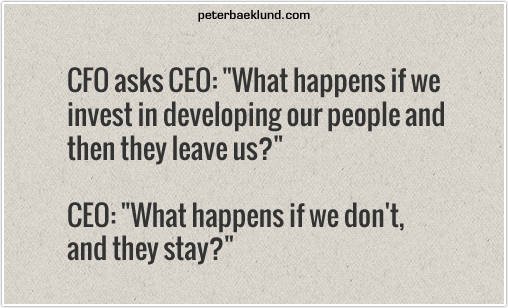 As families gather in the United States this week to celebrate the Thanksgiving holiday there will likely be a common inconsistency in their stories. Many will likely be thankful for the job that they currently have even though they are considerably dissatisfied with that job. With the economic downturn organizations have been so focused on squeezing out costs from their operations that most have neglected investing in their people. The result is that most employees are at a historically low level of engagement with their employers.
As families gather in the United States this week to celebrate the Thanksgiving holiday there will likely be a common inconsistency in their stories. Many will likely be thankful for the job that they currently have even though they are considerably dissatisfied with that job. With the economic downturn organizations have been so focused on squeezing out costs from their operations that most have neglected investing in their people. The result is that most employees are at a historically low level of engagement with their employers.
Seven years ago my team had just shut down the first of our two concept stores that we were running for consumer electronics retailer Best Buy. My team had spent the last two years operating these concept stores in an attempt to understand more about the opportunities in “small box” retail. During that time we had learned a ton and as a leadership team we were adamant that we needed to share what we had learned with the rest of the company.
Most leaders want their organizations to be innovative but just saying it isn’t enough. If they want their people to take risks and innovate they have to create a culture that can support and endure the ups and the downs of driving innovation. Driving sustained innovation requires the right people, processes, & tools.
When working with organizations I frequently talk about the need to build a “Propensity for Action” in order to support driving growth and innovation. With many for profit, and nonprofit, organizations it is far too easy to cower behind the “Tyranny of No” rather than building a culture of action around the tools of hypothesis, test, and verify. A frequently response from leaders is that new ideas are too costly or too risky to take on but if the alternative is waiting for the perfect answer it can be equally damaging to an organization. The challenge is that the odds are stacked against new ideas and most of them will not work out at planned – they will fail. The irony is that unless you are willing to take action and risk possible failure you will remain stuck with the status quo.
I often talk with business leaders about the need to build in a tolerance for risk taking and potential failure if they want to drive growth and innovate. Frequently I get asked if there are specific areas where we should not tolerate failure? My standard response is that Accounting would be one of those areas where organizations should be very cautious with “innovation” and the potential for failure. This story from today’s headlines in another such area.
Receive periodic email updates from Matt Hunt including his published pieces, updates on his progress, and more!